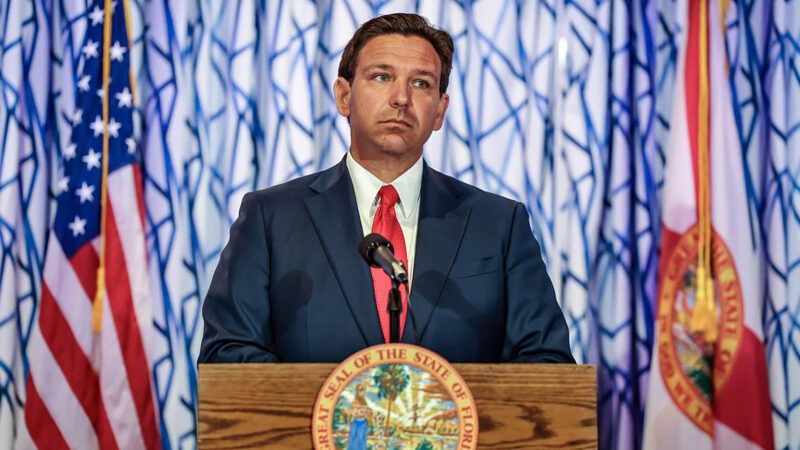Ron DeSantis Signs Social Media Age-Verification Bill
The law would require platforms to use invasive measures to prevent most teenagers under 16 from making social media accounts and bar all minors from sexually explicit sites.

On Monday, Florida Gov. Ron DeSantis (R) signed a bill enacting sweeping restrictions on minors' access to social media in the state. This comes just weeks after DeSantis vetoed a different age-verification bill, citing concerns that the first bill was too broad.
But the latest bill approved by DeSantis still places draconian limits on young people's ability to make social media accounts—and requires sites to infringe upon everyone else's privacy in the process.
Under House Bill 3, most social media sites will be required to deny accounts to those under 14 years old and terminate any accounts already held by kids under 14—including accounts that the platform isn't certain are held by someone under 14 but that the company "treats or categorizes as belonging to an account holder who is likely younger than 14 years of age for purposes of targeting content or advertising." Accounts held by 14- and 15-year-olds are also targeted for deletion under the law, though these teenagers can keep their accounts with parental permission.
The bill further states that any "commercial entity" that publishes content that is "harmful to minors" on a website or social media application must use age-verification measures to ensure that users under 18 cannot access the material. This section of the law appears to be written to prevent minors from accessing pornography websites, defining material "harmful to minors" as content that "appeals to the prurient interest," "depicts or describes, in a patently offensive way, sexual content," and "when taken as a whole, lacks serious literary, artistic, political, or scientific value for minors."
"You can have a kid in the house safe, seemingly, and then you have predators that can get right in there into your own home," DeSantis said during a press conference. "You could be doing everything right but they know how to get and manipulate these different platforms."
Companies that violate the law could face severe penalties, including up to $50,000 in damages per violation—and a payout of $10,000 more if they are sued by an individual minor over a violation of the law.
While the bill does not specify how exactly social media sites should verify a customer's age, with such large consequences for violating the law, it's likely that companies will require customers to hand over their government ID, submit to a facial scan, or otherwise hand over sensitive information.
"HB 3 forces Floridians to hand over sensitive personal information to websites or lose their access to critical information channels. This infringes on Floridians' First Amendment rights to share and access speech online," Carl Szabo, the vice president and general counsel of NetChoice, an organization that has sued to stop similar laws, wrote in a Monday press release. "We're disappointed to see Gov. DeSantis sign onto this route. There are better ways to keep Floridians, their families and their data safe and secure online without violating their freedoms."
Should the law face a constitutional challenge, it's likely to be overturned. Similar laws in California, Arkansas, and Texas have all been struck down by federal judges who said those bills violated the First Amendment by requiring social media sites to censor content.


Show Comments (54)